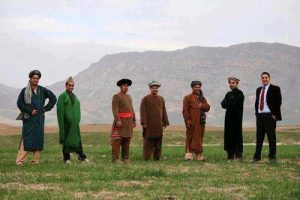Distributing EIDCs; from Power Monopoly to Impersonation
Ashraf Ghani, as he seeks to limit power for one ethnicity and has marginalized other ethnic groups, intends to show out the country as single ethnic and imposing the identify of an ethnic on other ethnic groups.

After nearly 5 years since the enactment of Civil Registration, the Afghan government has not yet been able to distribute electronic identity cards (EIDCs). The first EIDC was expected to be issued to former Afghan president Hamid Karzai, but he did not sign the “civil registration” law passed by the parliament in 1392 (solar year).
Since then, the issue of EIDCs has repeatedly raised but delayed due to people’s opposition. The main reason for suspending the distribution, is penning the word “Afghan” as a nationality for all the people of Afghanistan.
All non-Pashtun ethnics in Afghanistan are opposed to writing the word “Afghan” as their nationality and consider as the imposition of another ethnic identity on their own. For all people in the world, maintaining their true identity is a value; because all spirituality, history, and culture are represented by the same identity, it is the identity that distinguishes people from each other.
Now, after nearly 5 years, the presidential palace vowed that it has begun the registration process for distributing EIDCs. It has also announced that the word “Afghan” will be written as the identity of all ethnics living in Afghanistan. The supporters of the word “Afghan” as an identity for all ethnic groups in the country believe that “Afghan” is not equivalent to “Pashtun” and can play a key role in bringing the country closer and consolidates national unity. However, with a little research, one can see that “Afghans” are our compatriots whom we know as Pashtuns, contrary to what they tell the people. The word “Afghan” is the exact equivalent of the word Pashtun.
The Islamic encyclopedia considers the word “Afghan” or “Awghan” the same, saying it is the name of a tribe that has Hanafi sect and are brave and warlike people. Meanwhile, Dehkhoda dictionary considers the words Awghan, Afghan, and Pashtun as equal and the same.
Of course, there is no doubt that the distribution of EIDCs is in the interest of the people in Afghanistan; because it will greatly help the transparency of the upcoming elections and at the same time, will make Afghanistan a safer country. But what is worrying is that the presidential palace under the leadership of Ashraf Ghani, as he seeks to limit power for one ethnicity and has marginalized other ethnic groups, intends to show out the country as single ethnic and imposing the identify of an ethnic on other ethnic groups.
Unlike, what ARG palace says that penning the word “Afghan” can bring ethnic groups closer, this issue and imposing the identity of one ethnicity on other ethnic groups living in Afghanistan, indicates that the central government does not believe in reconciliation and pluralism in Afghanistan, and does not want to accept this reality either now or in the future.
After a controversial and fraudulent election in 2014, first, the “national unity government” which is not in Afghanistan constitution and no article guaranteed it, was imposed on the people of Afghanistan. Now, by inserting the word “Afghan” as a nationality for all the peoples living in Afghanistan, a false identity is imposed on the people of this country.
Mahdi Sarbaz – (DID) press agency
Translated by Taher Mojab